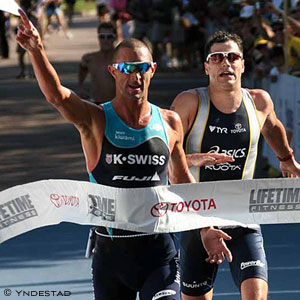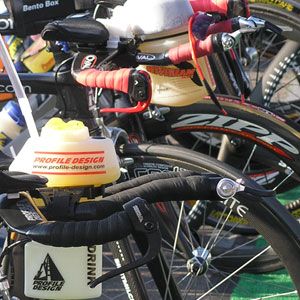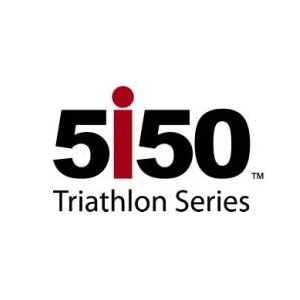Sometimes you eat the bear

"And sometimes, well, he eats you." So says The Stranger to The Dude in Coen Brothers' The Big Lebowski.
After observing the work product of various race organizations over the Summer and so far this Fall, observations by The Stranger are, at this juncture, in order.
Ironman (in the form of WTC) is probably no smarter, no more intuitive, it's no more professional, and in several cases no better funded, than other well-equipped and well-managed race organizations. It's just more intrepid.
But it hasn't made forward progress solely through strength and brawn. It's pushed up its shirtsleeves and outworked its competitors. Meanwhile Life Time Fitness abides. (Or so I seem to have observed.)
I'm going to use Life Time Fitness as a proxy, and I could be writing this about a number of race producers. Life Time Fitness is an apt example because it's got a series that works—or did so up through 2010—as a worthy counterbalance to Ironman's ambitions and expansion. But The Life Time Fitness Series has lost NYC Triathlon to Ironman, and instead of picking up one of Charles Brodsky's two Washington DC events, it got neither—rather Ironman picked up one of them.
As I spectate this—having interviewed several folks in and proximate to both the Ironman and Life Time Fitness' organizations—Life Time Fitness is a nimble Gale Sayers, moving East and West, surveying the line for an opening. Ironman is Bronco Nagurski, legs pumping straight ahead, moving North and South, inartful perhaps, breaking china, nevertheless picking up yardage.
There's nothing wrong with contemplating, calculating, holding meetings, choosing wisely, but while Life Time Fitness is thinking about and planning its event expansion, Ironman has boots on the ground and—armed with rifles and shovels—is taking ground town by town, yard by yard. At some point it's going to be too late for Life Time Fitness to expand. Ironman will have taken every town worth taking.
Even now, it's looking less like a campaign and more like a siege. This, because Life Time Fitness either lacks the will and focus at the top, or the talent at the point of execution. In any case, there seems to be a lack of urgency.

One hurdle at Life Time Fitness is that its brand and its business are focused primarily elsewhere, rather than in triathlon. Ironman does not own health and fitness clubs. It's got one job: To take everything in triathlon worth taking. Unless the owner of Life Time Fitness—Bahram Akradi—imbues and invests his events division with a clear, unequivocal, and public will to compete, he's going to lose his series.
If that happens, he'll still be a very successful businessman, and each of his series races will continue on without losing much by not being in any series per se. Each series race will continue on as a strong, independent event. But the synergy and branding of a series he'd certainly lose, along with the sponsorship and accompanying series prize money needed to fund a good pro field and season-long spectator interest.
Maybe that's the problem. Maybe that's why the urgency seems absent. There is no business category at Life Time Fitness for which the Life Time Fitness Triathlon Series, and the Race to the Toyota Cup, are survival imperatives.
Assuming Akradi does, however, take up the gauntlet, and redoubles his company's efforts to compete toe-to-toe in triathlon against Ironman, he needs to hold one very simple, very direct, meeting with his events division. He needs to say something like: "I want a half-dozen cities in focus on May 1 of every year. By October 1 I want races announced for the subsequent year in two of those cities. One of those races we will either purchase or partner with. The other is an event we will incept, build and own."
I don't think Akradi would have to make this speech at any other time in triathlon's history. I just think he has to make it now, because the race is on, the game is afoot, and in the business of big-time events you're either going to take market share, or it's going to get taken from you. Just ask owners of marathons with 2500 participants how well they sleep at night once Rock and Roll starts casting its gaze upon their towns.
To be sure, I keep hearing about one or two events added to the Race to the Toyota Cup next year. Still, it's mid-October, at this point the series is down one race heading into 2011, and I'm losing confidence that it's going to look any sexier in 2011 than it did in 2008.
Ironman and Life Time Fitness are not the only actors in this play. Competitor Group and its new TriRock series will have something to say about Ironman's mounting national hegemony over multisport. So will significant regional race organizations like Terry Davis' Tri-California Series that includes Wildflower, Pacific Grove and Treasure Island Triathlons. There's IMG with Escape to Alcatraz, the London Triathlon, Ironman Australia, Abu Dhabi, and Triathlon Alpe d'Huez. And I'm not forgetting Rev3Tri—Charlie Patton is not going to watch his brand go gently into that good night (indeed, I hear Rev3Tri's name a lot in prospective venue after venue around this country).
Still, what Ironman's hard push means for all these companies is: Be urgent, or be absent. Once Ironman places a significant race in Seattle, or Atlanta, or Boston, or Vancouver, or Toronto, it's going to set the agenda for these towns. The chance of another large race owned by a competing organization occurring here diminishes.
It's not as if these other organizations don't have the heft to compete against Ironman. Certainly IMG, Competitor Group—with its Rock and Roll Marathons—Life Time Fitness and Tri-California can boast of records of success in building big, impactful events from the ground up.
Just, it seems to me they fight using Marquis of Queensbury rules. Ironman competes as if it's in the Octagon.
Ironman is leaving its competition openings. Its 5150 is a severe leveraging of the Ironman brand—indeed, the word "Ironman" isn't even part of that new brand—and maybe the weight of that cantilever is too much to sustain. As strong as Ironman is with its own Ironman and Ironman 70.3 brands, as headbadges go its 5150 is a 98-pound weakling in comparison, for reasons I've stated elsewhere.
But don't bet the 5150 is going to remain an unimproved, unpolished brand for long. If you're a successful race organizer, roll up your sleeves and equip yourself to coexist alongside a company that does what you do; with very hard working and very ambitious men and women doing it; and an appetite for expansion in your direction.
If I sound anti-Ironman, I didn't write artfully. I'm pro Ironman, and I'm pro Ironman coming—or endeavoring to come—to your town and mine.
What's my point, then, urging, advocating for, gently prodding forward, Life Time Fitness? Because I believe in a market in balance. Life Time Fitness is a bulwark. As The Stranger said about The Dude: It's good knowing he's out there.



